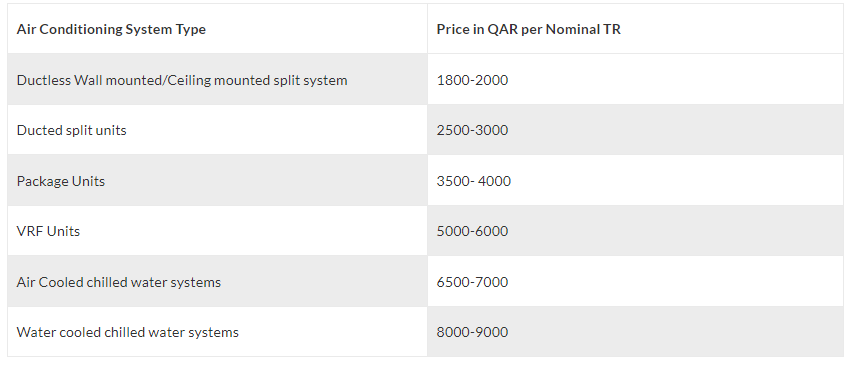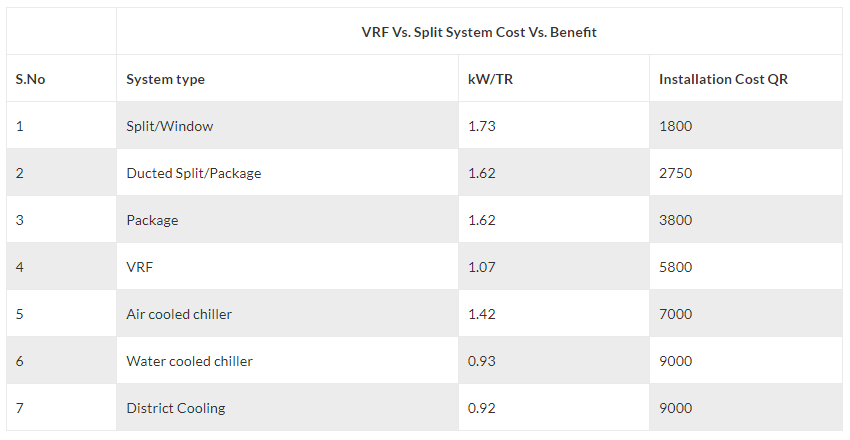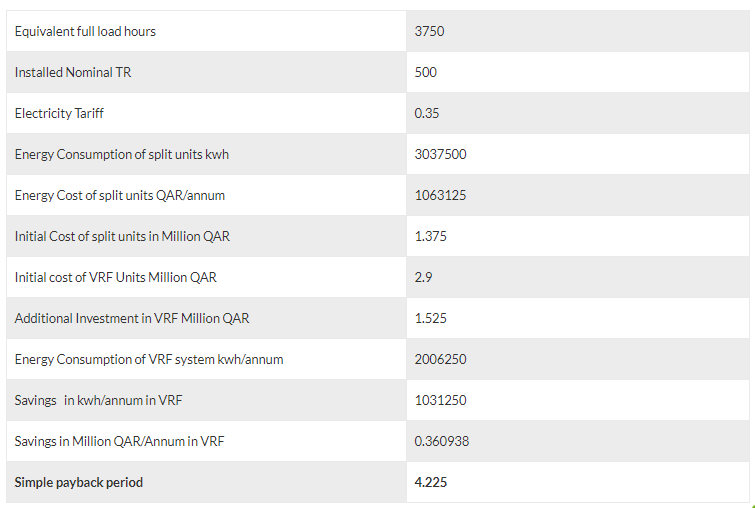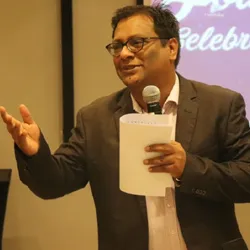In one of our recent projects targeting GSAS Certification, we have advised the client to change the HVAC system from Split to VRF. The client asked us about the return of investment and payback period. We have worked out on the initial and operational cost for different AC systems. We are publishing the basis of calculation, so that it can guide other projects pursuing LEED or GSAS Certification to choose the right system
In this article we will discuss
- Installation cost of different AC systems
- Energy Performance of different AC systems
- Financial analysis of VRF over air cooled central system and split /package system
- In what cases the projects can go for VRF systems
1. Installation cost of different AC systems:

Note: The prices can vary based on the manufacturer, project specifications, Air distribution system etc. The prices mentioned here only approximate based on interview with different manufacturers and contractors.
2. Energy Performance of different AC Systems:
In the absence of much literature on Energy performance of different AC systems in the region, the study recently conducted by RSB Dubai appears to be very close and hence we will consider the same for our calculation
Reference: http://www.rsbdubai.gov.ae/wp-content/uploads/2016/03/20160210-Webtext-Dubai-Cooling-Study.pdf
It is very clear that district cooling plants are the most efficient followed by water cooled central cooling system.


1. Financial analysis of VRF over air cooled central system and split/package system
Air cooled Central AC System:
The prices of Air cooled system and VRF systems are very much similar hence there is no incremental capital cost for the project. The operational cost VRF system is lesser resulting in significant reduction in Life cycle cost of the AC system
Let us do the math for 500 TR building,
Energy Consumption in Central Air Cooled System per annum = 500 TR * 3750
Equivalent Full load operational Hrs. * 1.42 KW/TR
=2662500 kWh
Energy Cost = 2662500 kWh * 0.35 QAR/kwh = 931875
Energy Consumption in VRF System per annum = 500 TR * 3750 Equivalent Full load operational Hrs. * 1.07 KW/TR
=2006250 kWh
Energy Cost per annum = 2006250 kWh * 0.35 QAR/kwh = 702187
Savings per annum = 656250 kWh
Considering the life of the equipment to be 10 years, the life cycle cost savings shall be 2.3 Million QAR.
Split Air Conditioning System:
The prices of split or package shall be around lesser by QR 2500/TR compared to VRF systems.
Let us do the math again for 500 TR building,
Incremental Cost = 500 TR * QR 2500/TR = QAR 1.25 Million
Energy Consumption in split or ducted AC system per annum = 500 TR * 3750 Equivalent Full load operational Hrs. * 1.62 KW/TR
=3037500 kWh
Energy Cost = 3037500 kWh * 0.35 QAR/kwh = 1063125
Energy Consumption in VRF System per annum = 500 TR * 3750 Equivalent Full load operational Hrs. * 1.07 KW/TR
= 2006250 kWh
Savings per annum =1031250 kWh
Simple payback period = 4.225
In the next article we will discuss more about commercial aspects of Energy Conservation Measures like Life cycle cost, Net Present Value (NPV) and Internal rate of Return (IRR) which is useful in Energy Audit.
Factors to be taken care when going for VRF System:
- Limitation in refrigerant pipe length
- Integration with conventional BMS system
- Skilled maintenance.
Summary and conclusion:
If the project is evaluating VRF against Air Cooled chilled water system and if there is feasibility of VRF systems. The straight choice would be to go for VRF system. If the project is evaluating VRF against split units the decision has to be taken based on financial priorities.
Conserve Solutions will be happy to assist your projects. Our offices are located in India, UAE, Qatar, Saudi Arabia, Canada, United Kingdom, Egypt and Singapore.
Author
-

Mr. K M Bazeeth Ahamed is an USGBC LEED Faculty & consultant in Green Buildings. He has completed his Post Graduation in Mechanical Engineering from Birla Institute of Technology in 2002 and has spent 12 years in Academics, Research, MEP Contracting, Energy Audits and Green Building Consultancy.


